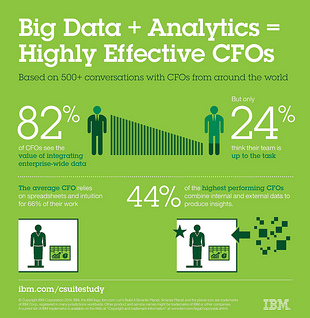(iTers News) - According to a new IBM study, the vast majority of CFOs (82%) see the value of integrating enterprise-wide data, but only 24% think their team is up to the task. This marks a 205% increase in the gap between the importance of data and the ability to exploit its value since the question was first asked in 2005, showcasing a critical divide in the skills and capabilities for today’s finance teams.
The study, entitled “Pushing the Frontiers,” is based on findings from face-to-face conversations with 576 CFOs from around the world. Conducted by IBM’s Institute of Business Value (IBV), the study found that CFOs’ expectations of their finance team have evolved, as have their views on technology. While macro-economic and market factors still lead the list of external forces they expect to have the most impact on their enterprises in the near future, technology is now third on the list – up from fifth place in 2010.
“In our discussions with CFOs over the past decade, the significance of technology and analytical tools in transforming the finance function and broader enterprise has continuously risen,” said Bill Fuessler, Partner, Finance, Risk & Fraud, IBM Global Business Services. “Data has always sat in the center of a CFO’s job responsibilities, and CFOs now recognize how insights from Big Data are helping their company become more competitive. CFOs are being asked to anticipate the future and discover new areas of revenue growth - we anticipate this will spur a new strategic alliance between the CFO and CMO as they partner to drive the corporate growth agenda.”
Highest Performing CFOs are Two Times Better at Integrating Enterprise-wide Data
Building on more than nine years of CFO conversations, the IBM research revealed a subset of CFOs called Value Integrators: individuals who are more effective in finance efficiency and analytical insight than their peers. This year the study also identified an even smaller set of high performers called Performance Accelerators, CFOs who have mastered their core duties so thoroughly that they’re far ahead of their peers. In fact, Performance Accelerators have been 70% more successful than Value Integrators, measured in terms of revenues and profits generated during the past three years.
The percentage of Performance Accelerators that are effective at integrating enterprise-wide information is double that of Value Integrators. Similarly, the percentage of those that are effective at continuously improving processes is 43% higher, while the percentage that are effective at developing finance talent is 48% higher.
A critical differentiator for these most successful CFOs is how they use data. While the average CFO relies on spreadsheets and intuition for the majority (66%) of their work, more than two-fifths (44%) of Performance Accelerators combine internal and external data to produce insights. As such, Performance Accelerators are more effective at conducting various forms of analysis including tracking and forecasting supply-chain financial data, planning and predicting resource capacity as well as conducting industry and competitor analysis.
Most significantly, Performance Accelerators use the deep insights they’ve unearthed to create profitable growth, spending more time on a wide range of activities, particularly forging an infrastructure to capitalize on Big Data, handling acquisitions and divestitures and developing new business models.
"At Pabst, we have transformed our finance function to move away from the proverbial thousand spreadsheet march, now using an analytics platform to completely shift the workloads of the finance team toward higher value activities," said Cordell Sweeney, SVP and CFO at Pabst Brewing Company. "Our business has a tremendous amount of information, and we have been able to change the culture by leading more robust data driven discussions with our leadership teams and field. Leveraging analytics has enabled us to change the conversation and become value-added partners, using business insights to drive decisions that lead to gaining market share, increasing profitability, and creating value for our shareholders."
One of the other defining characteristics of Performance Accelerators is that they typically operate much more efficiently than other CFOs. More than half have created a service delivery framework to guide the design, development and operation of key financial processes. They are also more likely than other finance organizations to use a standalone, cross-functional shared services center for transactional financial activities.
Performance Accelerators also have a much better grasp of the digital domain as nearly half work in companies with a seamlessly integrated physical-digital strategy. Further, the majority (70%) understands – and collaborates with – customers far more extensively than other CFOs.
IBM's Global Business Services consulting organization was recently named as the leader among the top 24 consulting firms in the world based on the quality and consistency of thought leadership material published by the IBV, according to Source for Consulting’s new White Space report.


